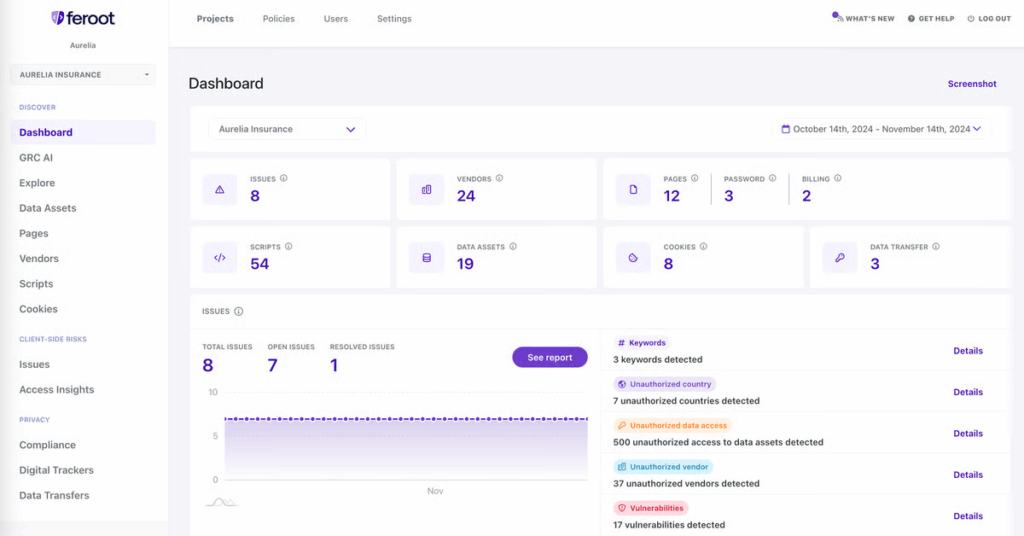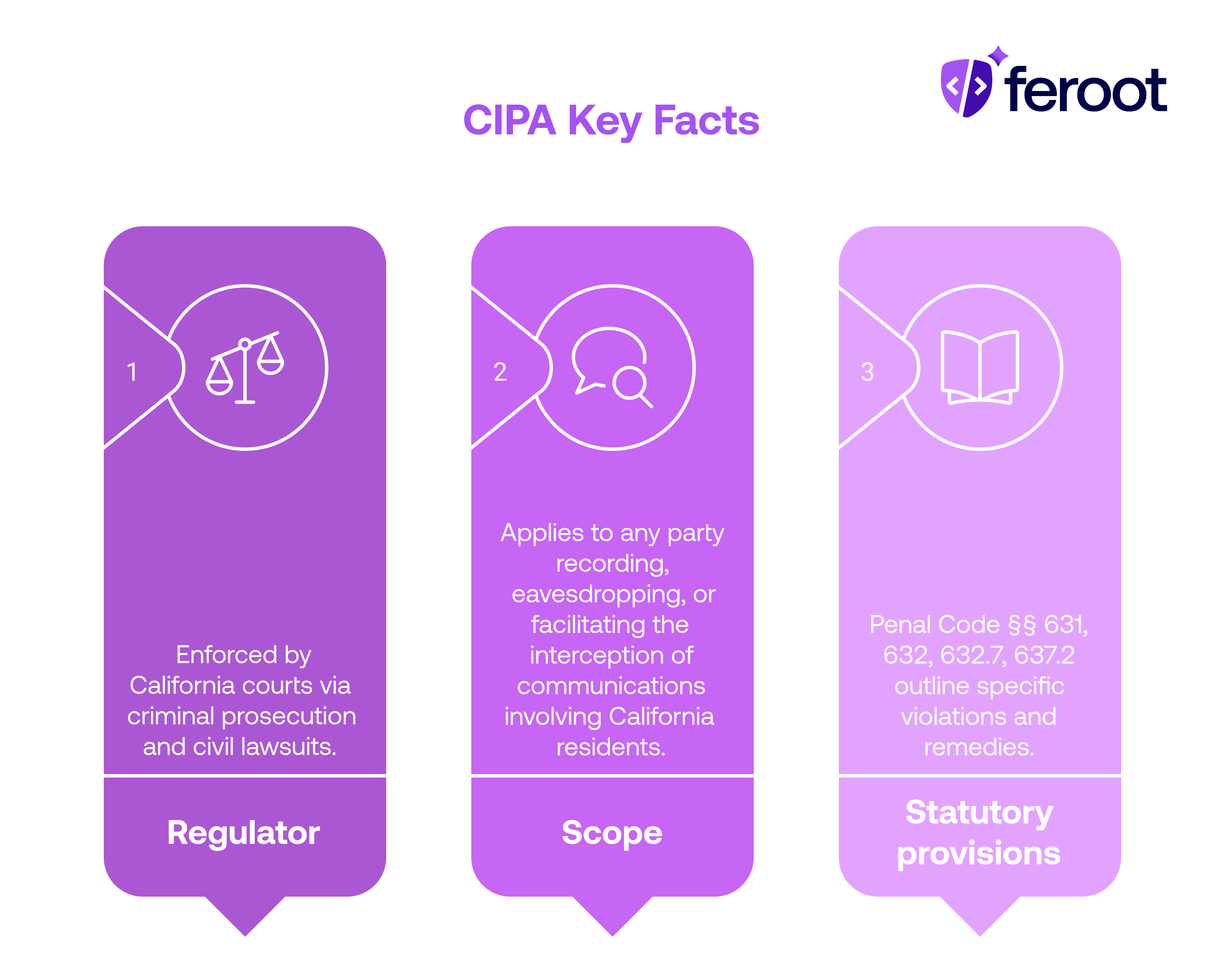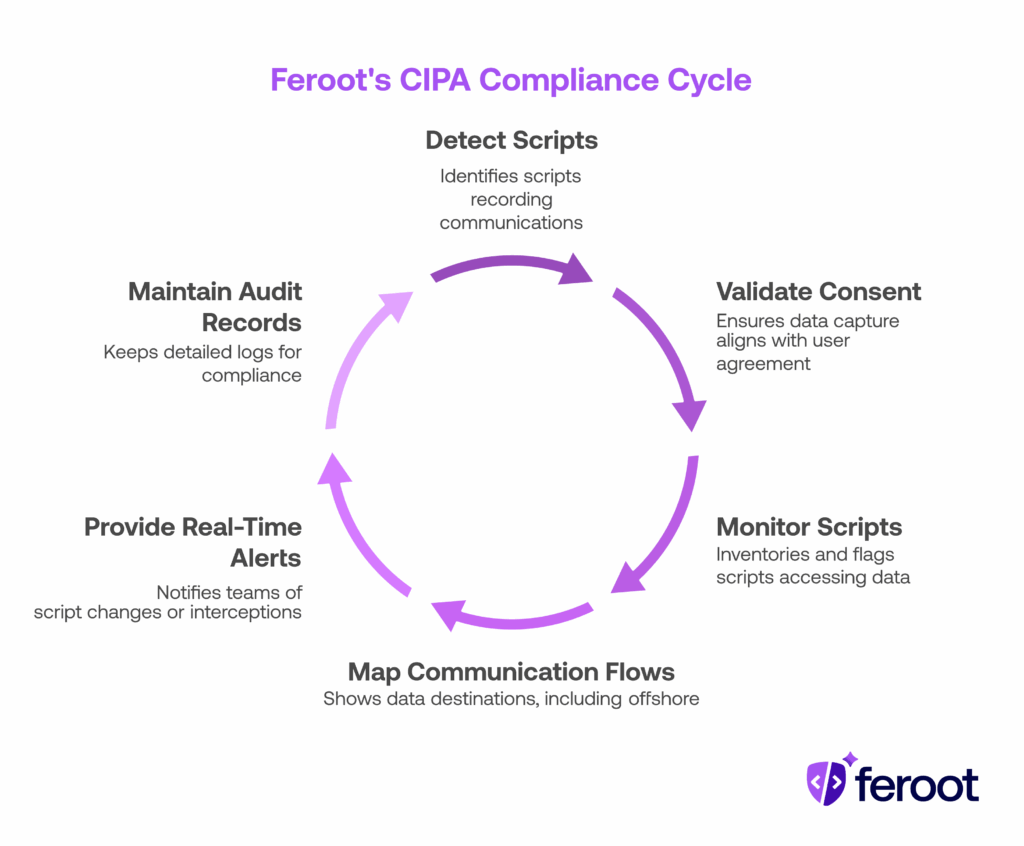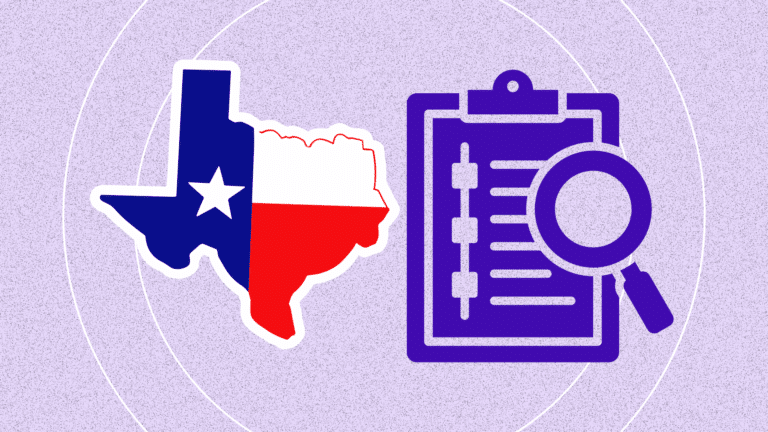TL;DR
- What it is: The California Invasion of Privacy Act (CIPA) is a state law that prohibits recording, eavesdropping, or intercepting confidential communications—whether by phone, chat, or web session—without the consent of all parties involved.
- Why it matters: CIPA applies broadly, including to websites and apps that use chat widgets, session replay tools, analytics, or other technologies that may capture user interactions.
- Who it applies to: Any organization doing business in California or communicating with California residents—regardless of where the business is located.
- Common pitfalls:
- Recording user interactions without prior, explicit consent (Penal Code §§ 631, 632)
- Third-party scripts intercepting or transmitting confidential communications without disclosure
- Failing to notify users about all data capture tools in use
- How Feroot helps: Feroot delivers real-time visibility into client-side scripts, monitors data flows, enforces consent before capture, and produces audit-ready logs to prove CIPA compliance.

Does the California Invasion of Privacy Act Apply to My Website?
Yes—if your website, app, or other online platform interacts with users located in California, CIPA may apply, even if your business is not physically based there.
Enforced under California Penal Code §§ 631, 632, 632.7, and 637.2, CIPA was originally designed to stop wiretapping and unauthorized call recording. Courts are increasingly applying it to digital communications, including web chats, form submissions, and user behavior tracking.
The challenge? Modern websites embed dozens of third-party scripts, pixels, and analytics tools that can record user interactions in the background—often before consent is obtained. Under CIPA’s strict all-party consent rule, this can be enough to trigger liability.
Feroot closes that gap by mapping, monitoring, and documenting every client-side action that could constitute “interception” under CIPA.
What Is the California Invasion of Privacy Act?
The California Invasion of Privacy Act (CIPA) is one of the strictest privacy laws in the U.S., requiring all-party consent before recording or monitoring confidential communications.
Key facts:
- Regulator: Enforced by California courts via criminal prosecution and civil lawsuits
- Scope: Applies to any party recording, eavesdropping, or facilitating the interception of communications involving California residents
- Statutory provisions: Penal Code §§ 631 (wiretapping), 632 (confidential communications), 632.7 (cellular and cordless communications), 637.2 (civil remedies)
Applies to:
- Businesses operating in or serving California residents
- Websites with embedded tools that capture keystrokes, clicks, chat messages, or audio/video streams
- Platforms using session replay, analytics, ad tech, or customer support scripts that could intercept communications
CIPA’s reach now extends far beyond phone calls—placing modern online tracking tools squarely in its enforcement zone.

Key CIPA Compliance Requirements
- All-party consent: You must obtain consent from every participant before recording or intercepting any confidential communication (Penal Code §§ 631, 632).
- Definition of “confidential”: Applies where there is a reasonable expectation of privacy—such as live chat sessions, web forms, or user navigation in restricted areas.
- Third-party liability: Embedding scripts from vendors that intercept communications can create aiding-and-abetting liability.
- Disclosure and notification: All data capture tools must be clearly disclosed before activation.
- No pre-consent capture: Scripts cannot collect data before the user has explicitly agreed.
Common CIPA Compliance Failures (Especially on the Client Side)
- Recording before consent: Session replay tools that start logging the moment a user lands on a page.
- Hidden third-party interceptors: Marketing pixels or chatbots sending conversation data to outside vendors without disclosure.
- Incomplete privacy notices: Policies that omit certain tracking tools or fail to explain their data collection behavior.
- Lack of monitoring: No detection system for when new scripts are added or existing ones change behavior.
- No audit trail: Inability to prove when and how consent was obtained in relation to specific scripts.
With CIPA lawsuits increasingly targeting web tracking practices, these gaps represent significant legal and financial risk.
How Feroot Powers CIPA Compliance
Feroot’s platform helps organizations meet CIPA’s strict consent and interception rules by giving teams real-time, browser-level visibility and control.
All-Party Consent Enforcement
- Detects when scripts begin recording communications before consent is granted
- Validates consent flows to ensure data capture aligns with user agreement
Third-Party Script Monitoring
- Feroot inventories all scripts—first- and third-party—running on your site
- Flags any that have access to chat, form, or interaction data
Communication Flow Mapping
- Feroot shows where communication data is sent—including any offshore or vendor endpoints
- Supports due diligence to prevent unauthorized disclosure
Real-Time Alerts
- Notifies security and compliance teams instantly when a script changes behavior or starts intercepting data
- Enables immediate remediation to stop violations before they escalate
Audit-Ready Records
- Detailed logs of script activity, consent timestamps, and communication flows
- Visual proof for use in audits, investigations, or litigation defense under CIPA

FAQ
What are the penalties for CIPA noncompliance?
Criminal fines up to $2,500 (misdemeanor) or $10,000 (felony) per violation, plus potential jail time. Civil suits can impose $5,000 per violation or triple actual damages.
Does CIPA apply to third-party scripts and cookies?
Yes—if they intercept or record communications, your business can be liable even if the vendor operates the tool.
Can Feroot detect pre-consent data capture?
Yes—Feroot monitors all client-side behavior and alerts when data is accessed before consent.
Are live chat tools covered by CIPA?
Likely—courts increasingly consider chat widgets “confidential communications” requiring all-party consent.
How can I prove compliance during litigation?
Feroot’s audit logs and visual data flow records show when consent was collected and exactly what scripts accessed communications.
Conclusion
The California Invasion of Privacy Act demands proactive prevention—not reactive defense—when it comes to digital communications. In a landscape where embedded scripts can create liability instantly, Feroot delivers the visibility, control, and proof you need.
With Feroot, you can:
- Detect unauthorized interception before it happens
- Monitor all scripts for risky behavior
- Block or mitigate third-party violations
- Maintain compliance-ready records for court or regulator review
Book a Feroot demo today to see how we keep you compliant—not just with PCI or HIPAA, but with CIPA too.


